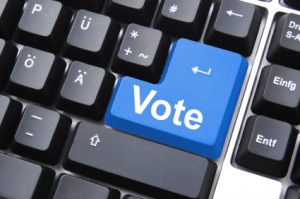 Did you vote? And no, I am not talking about for Romney or Obama. Or anything political for that matter. I am talking Facebook. A few years ago, Facebook was the first company of its kind to experiment with democracy when it provided its users with the right to vote on policy changes and updates. While news of this new social media democracy spread like wildfire, not even 1 percent of Facebook’s 1 billion users actually voted.
Did you vote? And no, I am not talking about for Romney or Obama. Or anything political for that matter. I am talking Facebook. A few years ago, Facebook was the first company of its kind to experiment with democracy when it provided its users with the right to vote on policy changes and updates. While news of this new social media democracy spread like wildfire, not even 1 percent of Facebook’s 1 billion users actually voted.
Facebook announced last week that it is taking back the right to vote, resulting in severe backlash from the general public and privacy advocacy groups around the world. Users took to their Facebook timelines to address their concerns and to attempt to protect their privacy and copyright rights by posting a long message with lots of legal mumbo jumbo. A bit of research can go along way as this ended up being a hoax fabricated to create a privacy scare amid Facebook’s recent privacy changes.
Facebook provided users with the right to vote back in 2009 in an attempt get feedback about updates to its policies. Since then, the company has tripled in size, gone public, and now has Wall Street stakeholders that it must answer to. Facebook pointed out that the voting process ended up emphasizing ‘quantity over quality’, and the experiment with democracy just didn’t work.
But before attacking Facebook for taking away the inalienable right to democracy, let’s take a minute to think about what Facebook is actually doing. Facebook’s recent changes are actually not new in the way businesses have defined the rules of the game with their customers for hundreds of years in society and now online. In the online world, we call these rules of engagement Terms of Use and Privacy Policies. These terms lay out clearly what consumers are allowed to do and not to do and also lay out what consumers can expect from the companies they are doing business with. This is no different to what has always happened in the ‘real’ world, where businesses like Target and Kmart won’t accept returns without receipts, don’t allow more than a few items in the dressing rooms at the same time, reserve the right to refuse service to anyone, use undercover cameras to look for shoplifters, and can search bags when a customer is exiting their store. Or take movie theaters as another example, where moviegoers risk removal from the cinema for bringing in a drink purchased at another store or for talking while a movie is playing.
Terms of Use and Privacy Policies have existed before Facebook was born, and yet many are blaming Facebook for ending an experiment that just didn’t work for their business or their customers. Democracy is a concept inextricably intertwined with the way governments should govern while preserving certain freedoms. One of the most quintessential rights in a democratic society is the right for a business to set the rules of how they want to interact with their customers. Similarly, consumers have the right to choose which businesses they interact with.
Kudos to Facebook for exercising its rights in a free democracy!
Hemanshu (Hemu) Nigam is an online safety, security, and privacy expert and CEO of SSP Blue, an online security consultancy. He is also a frequent contributor to CNN, HLN, Fox News Channel, Fox Business Network, CBS, HLNTV.com, and abcnews.com. To sign up for SSP Blue’s Weekly News & Info, please click here, like us on Facebook, and follow us on Twitter. See also Hemu’s personal site.
 A new scandal surfaces almost weekly in Hollywood, and nothing receives more media attention than the release of a new celebrity sex tape. With 42 million search results for “Kim Kardashian sex tape” appearing online, no question exists about the extent of the world’s fascination with publicized celebrity indiscretions.
A new scandal surfaces almost weekly in Hollywood, and nothing receives more media attention than the release of a new celebrity sex tape. With 42 million search results for “Kim Kardashian sex tape” appearing online, no question exists about the extent of the world’s fascination with publicized celebrity indiscretions.


Follow me